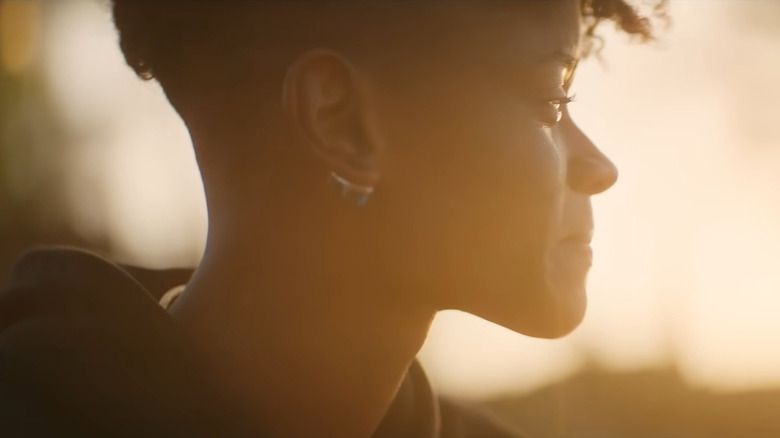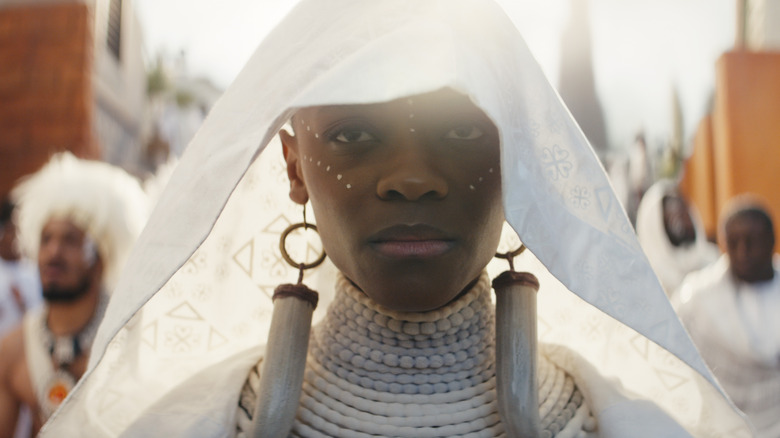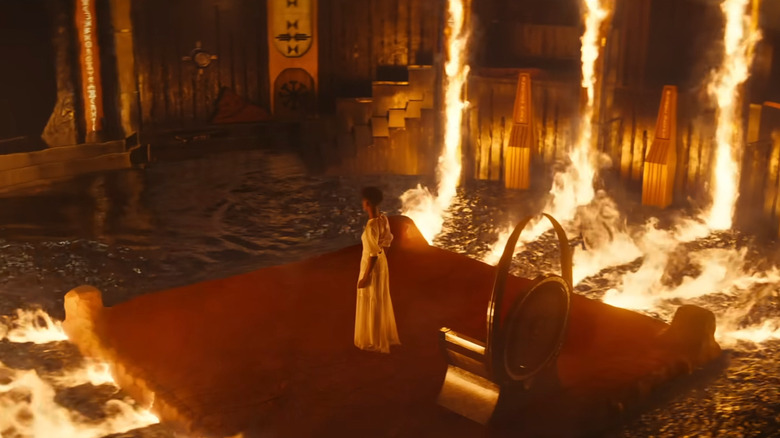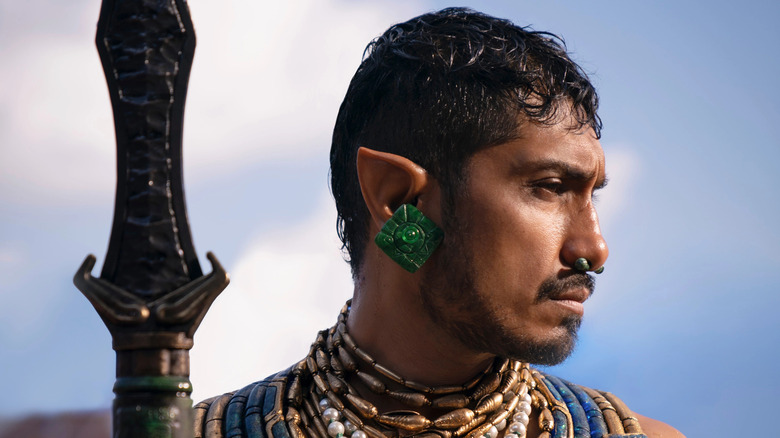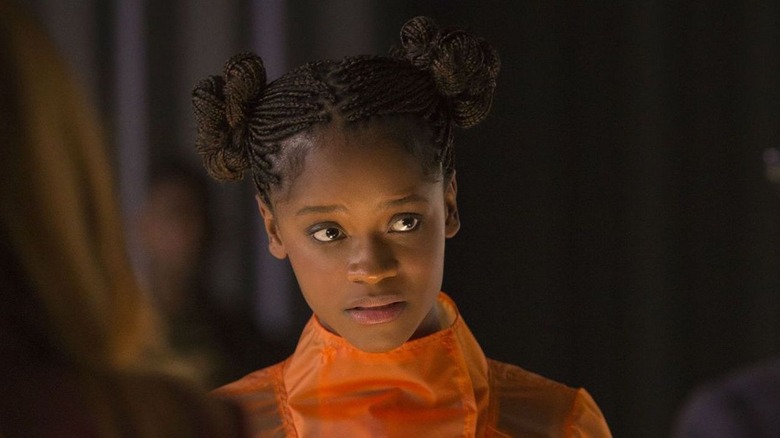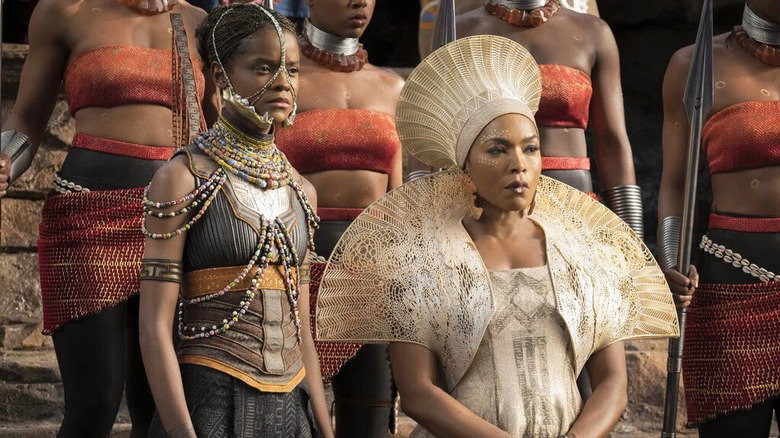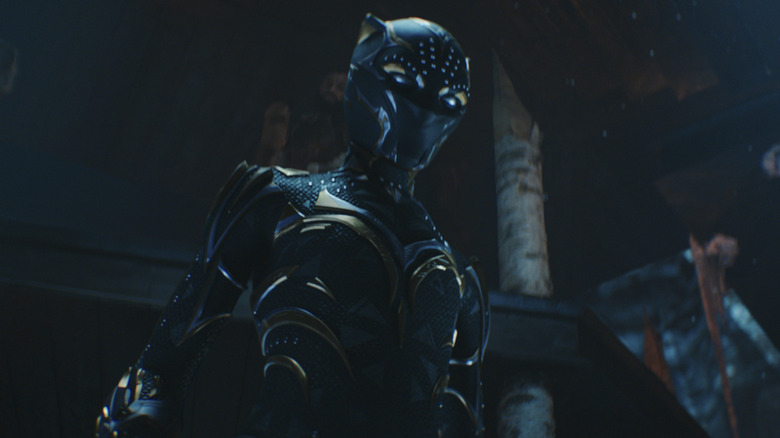A Real Psychologist Profiles Shuri From Black Panther: Wakanda Forever
We may receive a commission on purchases made from links.
(Welcome to Pop Culture Psych Profile, where we speak with experts about what drives the greatest heroes and villains in our favorite movies and TV shows. In this edition: Princess Shuri from "Black Panther: Wakanda Forever." This article contains major spoilers for the film.)
Marvel's "Black Panther: Wakanda Forever" is in theaters now and giving fans an outlet for their grief over the death of star Chadwick Boseman. In the film, T'Challa, King of Wakanda and the Black Panther, has died of a mysterious illness, and his sister Shuri (Letitia Wright) is feeling terrible guilt over the fact that her knowledge of science and technology couldn't save him.
While she's processing her grief and the emotions surrounding this, her country goes to war, and her mother, Ramonda (Angela Bassett), dies in the middle of a battle. Shuri is left to deal with being the last member of the ruling family, the responsibilities on her shoulders, her grief, a war, and an enemy who caused the death of her mother but who is also sort of a friend. Add to that her ambiguous feelings on the ancestral plane, her efforts to create a synthetic heart-shaped herb to take up the mantle of Black Panther, and a powerful discovery at the end of the film, and we have a young woman who is truly struggling.
I called on my colleague Brittani Oliver Sillas-Navarro, AMFT, M.A., PsyD (ABD), a clinical psychologist who specializes in grief counseling to help break down with Shuri is going through and how she's processing her feelings.
(Note: Oliver and I have both written chapters for the book "Black Panther Psychology: Hidden Kingdoms" in the Psych Geeks book series.)
The Subject: Shuri, Princess of Wakanda
Shuri is in a very different place than she was when her father was killed during the events of "Captain America: Civil War" (we saw the aftermath in the first "Black Panther" film). Sillas-Navarro explains that back then, she appeared to be handling it better than her brother T'Challa was. He struggled more with the death, while she was able to keep herself functional and resilient. What's happening now is that "There's rage, there's thought, there's sadness, there's mourning, there's a very big picture of what really complicated grief looks like." Sillas-Navarro says:
"And so I think that having these really compound losses really allow for her to express herself and allow for us to see her as a very intricate person and show the humanity of what loss is like because it is messy sometimes. And sometimes, it doesn't resonate and doesn't hurt that much, and sometimes it does. And all of these losses in a short amount of time were tough. [Her situation does a really good job] representing the complex nature of life, the complex nature of love, and what it means to fight for your family, fight with your family, and hurt because of these losses."
Sillas-Navarro says that we are often given a window for grief by society — she points out that usually, a bereavement gets some three days off of work, as though we're supposed to be better by the fourth day. That isn't how grief works, she explains. It can change based on different factors; how the death occurred, how sudden it was, our own age, our relationship with that person, and so much more. She says:
"We see that the death of her mother, for example, could be seen as extraordinarily traumatic because she was in the room. Whereas we have the death of her brother, that is long-suffering, and you have this ambiguous grief. And so the day of the diagnosis is when the grieving starts for ambiguous grief. And even though they hint towards it being this thing that they knew for a while and it was coming, we have no idea the actual length in which she grieved."
Basic behaviors
In addition, Sillas-Navarro explains that part of the issue is that Shuri has all this knowledge and technology, and none of it could stop T'Challa's death. She says that it leads to Shuri feeling like a failure. She also mentions that it's often an issue for treatment, because many people in the mental health field aren't trained for that long in terms of helping patients with grief, which can make it more difficult to treat.
One thing that Sillas-Navarro says is important to note is that the traditional Kubler-Ross model of the five stages of grief (denial, anger, bargaining, depression, acceptance) is more about your own experiences and your own mortality. What we're seeing with Shuri is that it doesn't match it in order. She says:
"I think that we see ... her rage, or her anger, just being like, I want to burn the world. I want to potentially end this person's [Namor] life because I'm filled with rage. And so we see grief played out in that way. And then we also see her at the ending of the movie, sitting on the beach sobbing. And so we have that depression, we have those massive feelings of sadness or those waves of sadness, pun intended."
Sillas-Navarro said that Shuri bounces around a lot, and we have to look at when it's in the background of her experience and when and how powerfully it's riding her:
"Usually, what I like to think about it is, is it a bee or is it a bear? Is it something small that's annoying, that kind of buzzes around and it's in your vicinity, or is it so dangerous that it can hurt you? And everything in-between. And so sometimes we see her be heroic and have resilience, and then sometimes we see her fighting her bear."
The rituals of grief
Wakanda has some rituals around death, which include the ceremonial burning of the funeral robes a year after the event, as well as a celebration of death rather than a quiet mourning period. As we see in the film, T'Challa's funeral procession involves joyous dancing. Sillas-Navarro explains that our grief rituals are dictated by our culture and that an individual has to decide which ones they're going to reject or accept based on their own beliefs and values. Shuri choosing to reject the burning of the robes at first is "maybe saying this is not the way that I see grief in my life, even though it's the way that my culture says to do so."
Ultimately, it does come down to the individual. In terms of cultural rituals, Sillas-Navarro says that we get to decide individually if we want to keep things and pass them on to future generations or stop them there. She mentions the celebration of life, and that speaking of "a home going" rather than a death can help with the things you still have in your heart:
"I guess for the Western world, African American society or Black society. We're thinking about how we experience loss and even down to the clothing that they wear. So you see [the people of Wakanda at the celebration of T'Challa's life] all in white, and that's pretty normal for people who look like me. And so you see this as a home going, you don't see this as a goodbye. It's just a 'see you later.' ... it's not something that is, they were alive one day and gone the next. You still have memories, you still have loving feelings, you still have regrets. You carry that with you until you pass. And so I think that this is a continuing these bonds. And so there's this idea now and a lot of great first research about continuing bonds. How do I reintegrate into the world with this person even though they're no longer with me?"
Sillas-Navarro says that integrating grief into your life is something that we can't avoid. Shuri will still be confronted with birthdays and holidays, and Mother's Day, and that "it's never going to stop. And so that's how we really try to focus on this continuing bond, continuing relationship... "
Finding connection in grief
One thing that Shuri does that can be helpful for a person in mourning is find a connection with someone else who has gone through loss. In this case, it's Namor, who speaks to her about the loss of his own mother. Sillas-Navarro said that this is very important going forward. She explains:
"So the number one thing that they do for grief interventions is you try to find a support group, not a processing group, which is different. So support groups and then try and do individual therapy simultaneously because you need somebody to look at who gets you ... so having some connection, even though he's talking about the death of his mother and she's talking about the death of both [her brother and her mother], it's different because yes, we have some shared experience, but I have a unique one.
"And so I think that we build connections with each other based off of similar experiences. It's really hard to go to one of your friends and say, 'Hey, here's this profound thing that happened to me.' And everyone else saying, 'That sucks.'"
Shuri's spirituality and how it affects her journey in grief
Spirituality is a big part of Wakanda, and Shuri is resistant to the idea of visiting the ancestral plane. Once she takes the synthetic heart-shaped herb, though, she does have visions. They're not the ones her brother T'Challa saw, and it has a major effect on her. Sillas-Navarro has studied the way both T'Challa and Killmonger dealt with the deaths of their fathers and how they reacted differently. She says of Shuri's vision:
"I think it's interesting how quickly she went from entertaining becoming a villain into the point of almost becoming one. Literally, razor's edge ... and her working through that. And I think that it's kind of cool because it doesn't really actually show that she just rebounded and just became a good hero figure. I think you still see all that darkness inside, that hurt inside, that anger inside, and that it's still within her.
"Whereas I think we see this hero's arc for a lot of people. And yet, in this conversation with her, he came to her for a reason. He came because there's still that part of her that's in there. And it's okay that it's in there. It's okay that sometimes we're villains. It's okay that sometimes we might act on urges that aren't perfect because none of us are perfect people."
In terms of the spirituality of Wakanda, Sillas-Navarro explains that often a traumatic loss can make us question a belief in a god who could do this to us. She says:
"And especially with being an African country, here are these things that are such huge values and so much to our core [...] I don't even know if she would call her agnostic, or atheist, or something else in these western terms, but she's struggling with the sense.
"I wonder if she didn't have that, the loss of her mother wouldn't have been so strong, and the loss of her mother so soon. If it was five years later, could she have had some kind of different perspective of equity in her life? And I don't know. But I think that spirituality is definitely pushed against ... And it's unfortunate, and it happens, and you think about, why God? Why would this happen to me? Why would this happen in my family? And so these are big questions when we're struggling with big issues."
The root cause of it all
Shuri already lost her father in a terrorist attack and her brother to an illness. Seeing her mother die has a profound effect on her. But she also has a lifetime of advice from her mother and a model for how to react to grief. I asked Sillas-Navarro about how Ramonda's beliefs and her parenting may have affected Shuri's reaction to the deaths of her family members. She says that we often try to hide our own grief from our children, wanting to model strength. She says, "I think with adults, with parents in particular, sometimes we fail to prepare our children for the enormous amount of experiences and emotional reactions that we'll have."
Often, Sillas-Navarro says, parents will go into their room to cry but then come out pulled together:
"So they don't get to see that you are hurting. They don't understand that daddy really misses mommy. They just see that daddy's strong and put together, and I have to be strong for them. We have to be strong because we have some sort of responsibility to something else or someone else."
She explains that it's not that we have to fall apart all the time, but that both things can happen. "This is to say that there can be both. There can be someone to say, I really miss her today, and I wonder if you miss her too. And let's talk about these experiences. Let's process together. Let's invite opportunities to have grief..."
It can be more pronounced with Shuri in a royal family, and how there is "pressure to perform constantly. And so this loss, or these losses, it kind of ripped her away from being forced to do any one thing because she wasn't guided to do any one thing." She says that had Ramonda not died, we might not have seen Shuri's full expression:
"We would have seen somebody who goes straight to her job, who gets embedded in her work. We would've seen this, quote, unquote, fully functioning person as opposed to somebody who is struggling sometimes. And not just struggling internally, but struggling spiritually, struggling mentally, struggling physically struggling socially in lots of different ways. We see her be more complex because now she has no one else to control what she's feeling."
The diagnosis
Sillas-Navarro suggests that some people would call this PTSD, but that she feels more comfortable with persistent complex bereavement disorder and that healing for her looks like "a lot of reintegration into who she is and what she wants." She says this will be a day-to-day process, and relying on her community could help:
"Is she going to potentially do therapy or do some sort of rituals that bring her closer to who she believes that she is? The interesting part about her is her age. And so now she gets to reintegrate into the world based off of these new sets of values and these new sets of understanding of how the world works. And so she might take years. There's this idea that grief should be over in a certain amount of time."
She says that grief and mourning can last "up to seven years" and that while she could meet the clinical standards of "depression with grief," grief itself isn't going away. "I think it's going to look different day to day for her, month to month, year to year, just based off some of it being her age in development and some with the relationships, how they died, all of those things are going to play a factor simultaneously. It's kind of like a perfect symphony of loss."
What's helped Shuri is making choices, especially in terms of seeing Namor as the enemy. Sillas-Navarro explains:
"I think it gives her a point back. I can do it. I can choose. I can make these choices. I think with loss, sometimes we feel very powerless. Sometimes we think that I'm reacting this way because I'm hurting. I'm doing this, I'm using substances, or sex, or something else to fill the void ... I think that this is an opportunity, a big one, for her to say, I didn't want to do something, and I didn't. I wanted to in the moment, but then I realized and reflected on actually who I am in this moment. And it all came together. And that means if it came together, then it can come together in the future, even if I fail in between."
She says that the exploration for Shuri in terms of her humanity and compassion could be massive for her, and she gets to decide why she makes those choices. "And the why is my favorite question."
Moving forward
Moving on, making decisions for a future without our loved ones can be hard, but it can bring good things with it. Shuri was told by Namor that only the most broken people can be great leaders. Whether Shuri ends up as solely the Black Panther or ends up ruling and leading her nation, Sillas-Navarro explains how it might affect her in the future:
"I think that it gives you a sense of empathy that others might struggle with. I think that it can also make you a really easy villain. It can turn you cold, it can turn you very hard because of the hardships that I have suffered. Not 'I' as in 'me,' but because of the hardships I have suffered, I justify my behavior of X, Y, Z. It's easy to go down that road. We see that in so many villain stories. [...] But building resilience gives you an opportunity to see people in a new way.
"It makes you more humane, it makes you more compassionate. It gives you a view of people that might be different than someone who just kind of elevates through the ranks. So I might be more willing to put up with other people's behavior or more kind, or more understanding, or more rational as opposed to someone who has hard, set lines because in therapy or in life, it's case by case in a lot of situations. All the rules don't fit for everybody unless it's issues of safety. And so I think that it's going to allow for her to be more of a fair person."
Sillas-Navarro also said that meeting her secret nephew Toussaint/T'Challa is potentially "life-changing" for Shuri. "It's all of these memories, and all of these moments, and all of these feelings forced into something." She said that it can allow "sort of new closure and really deepened the relationship of how this person was meaningful to me in my life."
